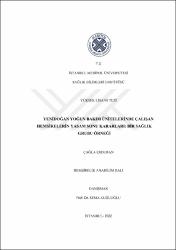| dc.contributor.advisor | Kuğuoğlu, Sema | |
| dc.contributor.author | Erduran, Çağla | |
| dc.date.accessioned | 2023-11-20T08:07:42Z | |
| dc.date.available | 2023-11-20T08:07:42Z | |
| dc.date.issued | 2022 | en_US |
| dc.date.submitted | 2022-07-07 | |
| dc.identifier.citation | Erduran, Ç. (2022). Yenidoğan yoğun bakım ünitelerinde çalışan hemşirelerin yaşam sonu kararları: Bir sağlık grubu örneği. (Yayımlanmamış yüksek lisans tezi). İstanbul Medipol Üniversitesi Sağlık Bilimleri Enstitüsü, İstanbul. | en_US |
| dc.identifier.uri | https://tez.yok.gov.tr/UlusalTezMerkezi/tezSorguSonucYeni.jsp | |
| dc.identifier.uri | https://hdl.handle.net/20.500.12511/11813 | |
| dc.description.abstract | Yenidoğan yoğun bakım ünitelerinde çalışan hemşirelerin yaşam sonu kararlarını değerlendirmek amacı ile kesitsel olarak planlanan tanımlayıcı bir çalışmadır. Araştırmanın evrenini, 2021 yılının Temmuz-Ağustos ayları arasında İstanbul'da bulunun bir sağlık grubuna ait hastanelerin yenidoğan yoğun bakım ünitelerinde çalışan 120 hemşire oluşturmaktadır. Çalışmada örneklem seçimine gidilmemiş olup, 18 yaş ve üzeri tüm gönüllü hemşireler araştırmaya dahil edilmiş, ancak pandemi sebebiyle raporlu olan 6 hemşireye ulaşılamamış, çalışma 103 gönüllü hemşire ile tamamlanmıştır. Araştırma verileri; "Yoğun Bakımda Yaşam Sonu Kararları Anketi" (EK-2) ve "Katılımcı Bilgilendirme Formu (EK-3)" ile çalışma formu kullanılarak toplanmış, YYBÜ çalışan hemşirelerin yaşamın sonuna ilişkin tercih, görüş ve uygulamaları ile kişisel ve mesleki özelliklerinin ilişkisi ki-kare testi ile değerlendirilmiş ve p< 0,05 anlamlı kabul edilmiştir. Elde edilen verilere göre hemşirelere göre hekimin mesleki ödevi "daima yaşamı sürdürmelidir" görüşü ile açıklanmaktadır. Bununla birlikte hemşireler için yaşamın korunma değeri ne kadar önemli ise yaşamın kalitesi de aynı derecede önem taşımaktadır. Hemşirelerin 78'i (%75,7) "Ötanazi uygulanmalı" görüşüne katılmamaktadır. Ayrıca hemşireler uygulanan kararların yasal düzeyde olması gerektiği fikrini desteklemektedirler. Yaşamı destekleyen tedavi kararlarında "Yaşamı Destekleyen Tedavi Sonlandırılmalı", "Ötanazi Uygulanmalı", "Canlandırmanın (NRP) Yapılması", "Eğer Acı Çekiyorsa Ötanazi Yapılması", "Kazara Çıkmış Olan Ventilatör Tekrar Yerine Takılmamalı", "Solunum Desteği Kesilmeli", ifadeleri ile dindarlık düzeyi arasında anlamlı ilişki bulunmuştur. Sonuç olarak yapılan araştırmada yenidoğan yoğun bakım ünitelerinde yaşamı destekleyen kararlar konusunda etik sorunlar yaşandığı belirlenmiştir. Bu nedenle yenidoğan hemşirelerinin klinik uygulamalarında temel etik ilkelere uygun karar almalarını desteklemek için ayrıntılı rehberler geliştirilmesi önerilmektedir. | en_US |
| dc.description.abstract | This is a cross-sectional descriptive study to evaluate the end-of-life decisions of nurses working in neonatal intensive care units. The universe of the research consists of 120 nurses working in the neonatal intensive care units of hospitals belonging to a health group in Istanbul between July and August 2021. No sample selection was made in the study, and all volunteer nurses aged 18 and over were included in the study, but 6 nurses who were reported due to the pandemic could not be reached, and the study was completed with 103 volunteer nurses. Research data; It was collected using the "End of Life Decisions Questionnaire in Intensive Care" (Appendix-2) and the "Participant Information Form (Appendix-3)" and the study form. The relationship between the preference for end of life, opinions, practices, and their personal and professional characteristics of the nurses working in the NICU evaluated with chi-square test, and p< 0.05 was considered significant. According to the data obtained, for the nurses, the professional duty of the physician is explained with the view that "it should always lead to life". However, the quality of life is as important as the value of protecting life for nurses. 78 (75.7%) of the nurses do not agree with the opinion that "Euthanasia should be applied." In addition, the nurses support the idea that the decisions applied should be at the legal level. In life-supporting treatment decisions, with the statements; "Life-Supporting Treatment Should Be Terminated", "Euthanasia Should Be Performed", "Resuscitation (cpr)", "Euthanasia Should Be Performed If Suffering", "Accidentally Disconnected Ventilator Should Not Be Replaced", "Respiratory Support Should Be Interrupted"between expressions like and the level of religiosity relationship was found. As a result, it was determined in the study that there are ethical problems in neonatal intensive care units regarding decisions that support life. For this reason, it is recommended to develop detailed guides to support neonatal nurses' decision-making in accordance with basic ethical principles in their clinical practice. | en_US |
| dc.language.iso | tur | en_US |
| dc.publisher | İstanbul Medipol Üniversitesi, Sağlık Bilimleri Enstitüsü | en_US |
| dc.rights | info:eu-repo/semantics/openAccess | en_US |
| dc.subject | Etik | en_US |
| dc.subject | Hemşire Tutumları | en_US |
| dc.subject | Yaşam Sonu Dönem | en_US |
| dc.subject | Yenidoğan | en_US |
| dc.subject | Yenidoğan Yoğun Bakım Ünitesi | en_US |
| dc.subject | Ethics | en_US |
| dc.subject | Nurse Attitudes | en_US |
| dc.subject | End of life Period | en_US |
| dc.subject | Newborn | en_US |
| dc.subject | Neonatal İntensive Care Unit | en_US |
| dc.title | Yenidoğan yoğun bakım ünitelerinde çalışan hemşirelerin yaşam sonu kararları: Bir sağlık grubu örneği | en_US |
| dc.title.alternative | End of life decisions of nurses working in newborn intensive care units: A health group example | en_US |
| dc.type | masterThesis | en_US |
| dc.department | İstanbul Medipol Üniversitesi, Sağlık Bilimleri Enstitüsü, Hemşirelik Ana Bilim Dalı | en_US |
| dc.relation.publicationcategory | Tez | en_US |
| dc.institutionauthor | Erduran, Çağla | |


















